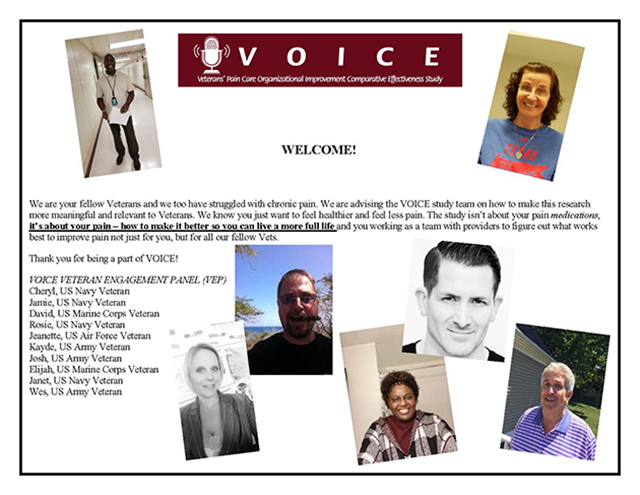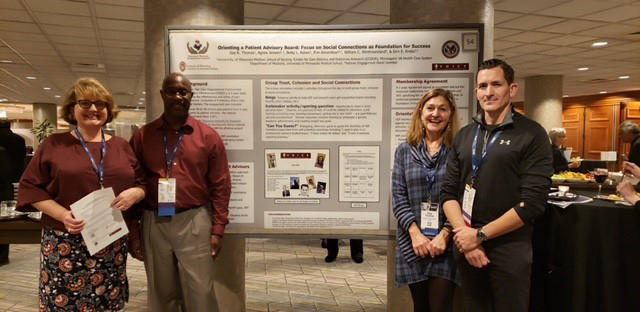 |
VOICE Study Partners with Veteran Engagement Panel to Improve Pain Care, Reduce Harms of Opioid TherapyHSR&D’s monthly publication Veterans’ Perspectives highlights research conducted by HSR&D and/or QUERI investigators, showcasing the importance of research for Veterans – and the importance of Veterans for research. In the May 2021 Issue:
|
IntroductionVOICE StudyThe Veterans Pain Care Organizational Improvement Comparative Effectiveness (VOICE) Study is being conducted at multiple VA Health Care Systems including Minneapolis, MN (coordinating center), Ann Arbor, MI, Dallas, TX, Denver, CO, Durham, NC, Providence, RI, West Haven, CT, Portland, OR, and Nashville, TN.The Veterans Pain Care Organizational Improvement Comparative Effectiveness (VOICE) Study is a pragmatic randomized trial conducted in VA facilities with VA resources and research funding from the Patient Centered Outcomes Research Institute (PCORI). Dr. Erin Krebs of the Minneapolis VA Health Care System’s Center for Care Delivery and Outcomes Research (CCDOR) leads the study, which is conducted across 10 VA sites. The VOICE study compares an integrated pain care approach with a pharmacist pain care approach to improve pain management and reduce potential harms of opioid therapy. The study completed recruitment after enrolling 820 Veterans with moderate to severe pain despite treatment with daily opioid medications. All Veterans enrolled in the study will complete their one-year participation in early 2022. The VOICE Veteran Engagement PanelIn 2017, ten Veterans with chronic pain formed the VOICE Veteran Engagement Panel (VEP) to support the VOICE study. They are a diverse group of five men and five women who have had different journeys with chronic pain. Members were recruited from VOICE study sites and have received care at seven different VA facilities. Each member of the group applied to be part of the panel and was open to participation for the entire five-year project, which has since been extended to six. Panel member Rosie Glenn described this long-term relationship well: “When I first came to the study, I was not sure if I would have anything to contribute. As time passed, I was able to find my niche. I feel like I am contributing to something worthwhile... My opinion actually matters. I am invested.” Since 2017, the VEP has met monthly to problem-solve and provide feedback to VOICE researchers. They met in person once, then via telephone, and eventually transitioned to virtual meetings in early 2020 due to the COVID-19 pandemic. Balancing life demands while managing chronic pain can be difficult. Multiple panel members are working or attending school, raising children, or caregiving for other family members. VEP members share their unique perspectives. 
VOICE VEP Introduction pamphlet Identifying Problems and Designing SolutionsThe VEP helped the study team identify potential problems and suggested solutions. Early in the study, the research team encountered difficulty with recruitment. Potential enrollees could not meet the study requirement of attendance at a 2-hour initial visit with local study coordinators. The VEP identified barriers of transportation discomfort, cost, and lack of availability/equity. Together, members of the VEP and research team developed a tiered travel-pay system for the initial 2-hour visit based not necessarily on mileage, but which recognized a diversity of experiences. This new model helped address problems faced by Veterans in urban areas, who may travel only a short distance but still face significant ride-share or taxi costs, as well as more rural Veterans who traveled longer distances. With the help of the VEP, protocols were also adapted to allow all study activities to occur virtually and the VOICE team became a successful early adopter of VA Video Connect in 2018. When the study team proposed video visits, the VEP provided the following key assistance:
Due in part to these steps, VOICE was well poised to keep the study operational after COVID-19 struck. In fact, the pandemic delayed VOICE recruitment by only a few months. As one member shared: “I think the biggest benefit is that we actually get to know the study. We see what’s working and what's not. We can use that to help solve future problems with the study...” Continuing to Serve and SupportVeteran engagement is a growing trend within VA research, bringing more opportunities for members to share the knowledge they’ve gained on the VOICE VEP. An early ground rule for the group was to ensure no individual member was singled out or asked to repeatedly “represent” the panel, with all members being equal partners. As new opportunities arise, they are presented to the entire panel, and members volunteer as they are available. Several have volunteered to participate on new panels, or share their insights at local and national meetings:

VOICE staffer Agnes Jensen, VEP members William Westmoreland and Elijah Sacra, and Gay Thomas of the University of Wisconsin present a poster at the October 2018 PCORI national meeting. VEP members were interviewed and featured in three educational pamphlets meant for a patient and family audience: Non-Drug Treatments for Chronic Pain Management, How to Taper An Opioid Medication, and Should you Take Opioids to Treat Pain?. All are publicly available on the VOICE website. In the last semi-annual evaluation, members shared the following: “The membership and participation of this study has been a treasure trove of data and insight into the work of pain management.” “The whole group has been wonderful. They have been very engaging and accommodating.”
Erin Krebs, MD, MPH, is the Principal Investigator of the VOICE study, as well as a Core Investigator at HSR&D’s Center for Care Delivery and Outcomes Research (CCDOR) and Chief of General Internal Medicine at the Minneapolis VA Health Care System.
Next StepsAs the VOICE trial ends enrollment, the panel’s focus will shift to helping the research team interpret results and disseminate findings. VEP members will give patient-centered advice on both style and substance to ensure research findings are presented clearly to Veteran, caregiver, and non-Veteran patient audiences. The VEP recently submitted its first co-authored manuscript, a narrative piece titled “Not all groups come together, but this one just clicks. Ten Tips for Sustaining an Engagement Panel.” They will provide patient-centered perspectives on VOICE study manuscripts written by investigators and will likely co-author future pieces as well. William Westmoreland, who earned his PhD while serving on the panel, describes the group’s mission well: “Our VEP brought together generations of military service, all with the same mindset: to bring better care and treatment for current and future Veterans seeking care.” |